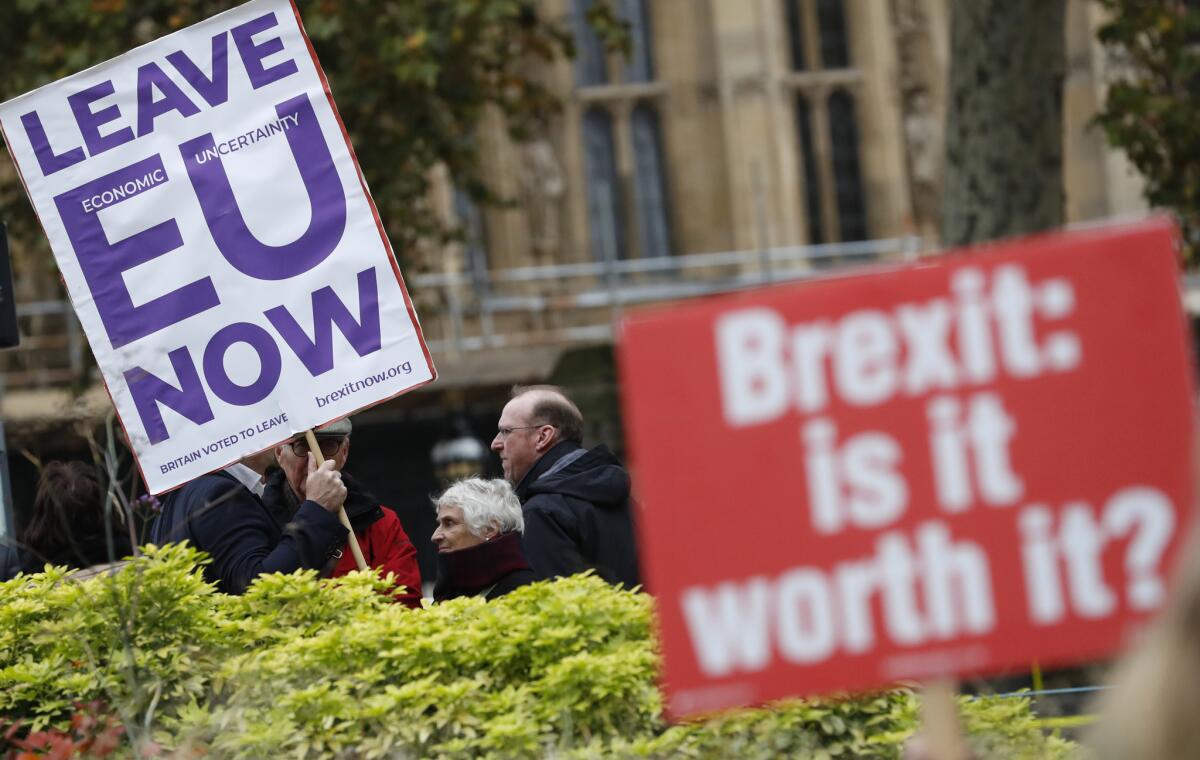Britain’s Supreme Court slaps Boris Johnson. The Brexit battle is back on in Parliament

- Share via
LONDON — What is white and red and crosses the Atlantic Ocean as fast as it can? How about Britain’s embarrassed blond bombshell, Prime Minister Boris Johnson, who flew home early from the United Nations General Assembly on Tuesday night with a British Supreme Court judgment —and calls to resign from across the British political spectrum — ringing in his ears?
Johnson had suspended, or prorogued, Parliament until Oct. 14 in what was widely assumed to be a ploy to get fractious lawmakers out of the way as he plotted to force a Brexit from the EU on Oct. 31, with or without a deal covering trade rules, travel and a host of details going forward. In a historic judgment, the court claimed jurisdiction and unanimously said, “Not so fast.”
Americans who were paying attention were probably gratified to see their understanding of what “constitutional” means in the United Kingdom comprehensively addressed by the decision. Just two aspects of the British Constitution seem to lodge in the American consciousness. Firstly, it’s very, very old; and secondly, as an unwritten (and therefore inherently flaky) “document,” it’s probably not worth the paper it’s not written on.
The Supreme Court graphically illustrated the first point, in citing the Case of Proclamations from 1611 in its ruling: “The King hath no prerogative, but that which the law of the land allows him” (which sounds like an out-take from “Hamilton”). And it was at pains to debunk the second: “Although the United Kingdom does not have a single document entitled ‘The Constitution’, it nevertheless possesses a Constitution.”
So there.
But what power does that Constitution actually give our Supreme Court? Not the straightforward constitutional oversight of the American version, which was established by the U.S. Constitution and which, since Marbury vs. Madison, has been the final arbiter on controversies arising under it or the laws passed by Congress.
The high court’s position is rather murkier in a parliamentary sovereignty such as the United Kingdom. Here, laws enacted by Parliament reign supreme, and no Parliament can pass laws that future Parliaments cannot change. The courts are bound to apply Parliament’s legislation, whether or not the judges believe it to be consistent with the Constitution or with earlier laws. Our Supreme Court wasn’t even called “Supreme” until Oct. 1, 2009, when it finally assumed the judicial functions that had belonged to a committee of the House of Lords, making the separation of powers a little bit more explicit.
So how did this poor relation in the branches of British government give the prime minister such a bloody nose, and did it overreach itself in doing so?
The answer lies in another British constitutional principle: Parliamentary accountability, which follows from the sanctity of parliamentary sovereignty. As the Supreme Court put it, “The longer that Parliament stands prorogued, the greater the risk that responsible government may be replaced by unaccountable government.” Put another way, the law requires a very good reason for Parliament to be suspended, especially while it is hell-bent on holding the executive to account.
As soon as you recognize limits on the prime minister’s power of prorogation, there is a boundary for the courts to patrol. And as far as the Supreme Court was concerned, this was no soft border: “It is impossible for us to conclude, on the evidence which has been put before us, that there was any reason — let alone a good reason — to advise Her Majesty to prorogue Parliament for five weeks... . It follows that the decision was unlawful.”
Brexit is a supremely divisive issue in the United Kingdom, and the Supreme Court’s judgment has polarized opinion along predictable lines. But when leading U.K. pollsters, YouGov, asked members of the public if they agreed or disagreed with the Supreme Court’s ringing judgment that Johnson acted unlawfully in proroguing Parliament, 49% agreed, 30% disagreed, and 21% didn’t know. Given how fractured we have become, we’ll take that as encouragement that we can come together again when we really need to. Mr. Johnson has at least succeeded in achieving that.
Unfortunately, no one has a clue what will happen next. The Supreme Court emphasized that “the issue in these appeals is not when and on what terms the United Kingdom is to leave the European Union.” Parliament reconvenes Wednesday morning, as if the suspension never happened. A law passed by those pesky parliamentarians before the voided prorogation requires Johnson to delay Brexit (again), if he can’t craft a deal that the members of Parliament and the European Union agree to. There is no sign of such a deal or even of the political will to forge one, and so far, Johnson hasn’t backed down from his vow to drag the U.K. out of Europe with or without coming to terms by Halloween.
In theory there could even be another prorogation, although after the court’s decisive intervention this fall, one thing is certain in this time of uncertainty: The courts will be ready to claim jurisdiction over the decisions of the executive if they are called upon.
Guy Winter is a lawyer in London.
More to Read
A cure for the common opinion
Get thought-provoking perspectives with our weekly newsletter.
You may occasionally receive promotional content from the Los Angeles Times.






